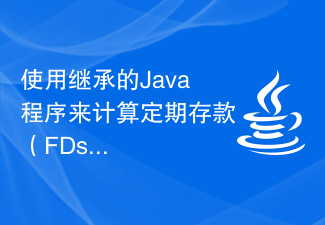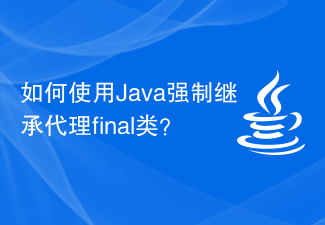 Backend Development
Backend Development C++
C++ Polymorphism of function overriding and inheritance: the art of realizing flexible calls between objects
Polymorphism of function overriding and inheritance: the art of realizing flexible calls between objectsFunction rewriting and inherited polymorphism are two key concepts to achieve flexible object calling in OOP: Function rewriting: the derived class redefines the function of the same name in the base class, and executes the specific implementation in the derived class when called. Polymorphism of inheritance: A derived class can be used in the same way as a base class, and when a method is called through a base class reference, its implementation in the derived class is executed.

Polymorphism of function rewriting and inheritance: the art of realizing flexible calls between objects
Preface
Polymorphism of function overriding and inheritance are two important concepts in object-oriented programming (OOP). They allow objects to perform different actions according to their types, thereby achieving code flexibility and reusability.
Function rewriting
Function rewriting refers to redefining the function of the same name in the base class in the derived class. When a derived class object calls this overridden function, the specific implementation in the derived class will be executed without calling the original implementation in the base class.
Code Example:
class BaseClass:
def do_something(self):
print("Base class method called")
class DerivedClass(BaseClass):
def do_something(self):
print("Derived class method called")In this example, DerivedClass overrides do_something in BaseClass method. When the DerivedClass object calls the do_something method, the overridden version in DerivedClass will be executed.
Inherited polymorphism
Inherited polymorphism means that the derived class can be used in the same way as the base class. This means that you can use a reference from the base class to refer to an object of the derived class and then call a method in the base class and that method will be executed in the derived class in a way specific to it.
Code Example:
def do_something(obj):
obj.do_something()
base_obj = BaseClass()
derived_obj = DerivedClass()
do_something(base_obj) # 调用基类方法
do_something(derived_obj) # 调用派生类重写方法In this example, the do_something function is called ## using a base class reference obj #do_somethingmethod. When obj refers to the BaseClass object, the base class method will be executed; when obj refers to the DerivedClass object, the derived class override will be executed. method.
Practical CaseIn an e-commerce system, you can use polymorphism to achieve flexible payment processing. You can define a base class of
PaymentMethod and create derived classes for different payment methods (e.g. credit card, PayPal). Each derived class can override the process_payment method to process payments using a specific payment gateway.
PaymentMethod.
Conclusion Function overriding and inherited polymorphism are powerful tools in OOP, and they enable you to implement flexible calls between objects. By understanding these concepts, you can write code that is more flexible, reusable, and maintainable.
The above is the detailed content of Polymorphism of function overriding and inheritance: the art of realizing flexible calls between objects. For more information, please follow other related articles on the PHP Chinese website!
 解决PHP报错:继承父类时遇到的问题Aug 17, 2023 pm 01:33 PM
解决PHP报错:继承父类时遇到的问题Aug 17, 2023 pm 01:33 PM解决PHP报错:继承父类时遇到的问题在PHP中,继承是一种重要的面向对象编程的特性。通过继承,我们能够重用已有的代码,并且能够在不修改原有代码的情况下,对其进行扩展和改进。尽管继承在开发中应用广泛,但有时候在继承父类时可能会遇到一些报错问题,本文将围绕解决继承父类时遇到的常见问题进行讨论,并提供相应的代码示例。问题一:未找到父类在继承父类的过程中,如果系统无
 使用继承的Java程序来计算定期存款(FDs)和定期存款(RDs)的利息Aug 20, 2023 pm 10:49 PM
使用继承的Java程序来计算定期存款(FDs)和定期存款(RDs)的利息Aug 20, 2023 pm 10:49 PM继承是一个概念,它允许我们从一个类访问另一个类的属性和行为。被继承方法和成员变量的类被称为超类或父类,而继承这些方法和成员变量的类被称为子类或子类。在Java中,我们使用“extends”关键字来继承一个类。在本文中,我们将讨论使用继承来计算定期存款和定期存款的利息的Java程序。首先,在您的本地机器IDE中创建这四个Java文件-Acnt.java−这个文件将包含一个抽象类‘Acnt’,用于存储账户详情,如利率和金额。它还将具有一个带有参数‘amnt’的抽象方法‘calcIntrst’,用于计
 如何在PHP中使用多态和继承来处理数据类型Jul 15, 2023 pm 07:41 PM
如何在PHP中使用多态和继承来处理数据类型Jul 15, 2023 pm 07:41 PM如何在PHP中使用多态和继承来处理数据类型引言:在PHP中,多态和继承是两个重要的面向对象编程(OOP)概念。通过使用多态和继承,我们可以更加灵活地处理不同的数据类型。本文将介绍如何在PHP中使用多态和继承来处理数据类型,并通过代码示例展示它们的实际应用。一、继承的基本概念继承是面向对象编程中的一种重要概念,它允许我们创建一个类,该类可以继承父类的属性和方法
 PHP中的封装技术及应用Oct 12, 2023 pm 01:43 PM
PHP中的封装技术及应用Oct 12, 2023 pm 01:43 PMPHP中的封装技术及应用封装是面向对象编程中的一个重要概念,它指的是将数据和对数据的操作封装在一起,以便提供对外部程序的统一访问接口。在PHP中,封装可以通过访问控制修饰符和类的定义来实现。本文将介绍PHP中的封装技术及其应用场景,并提供一些具体的代码示例。一、封装的访问控制修饰符在PHP中,封装主要通过访问控制修饰符来实现。PHP提供了三个访问控制修饰符,
 PHP中的多重继承Aug 23, 2023 pm 05:53 PM
PHP中的多重继承Aug 23, 2023 pm 05:53 PM继承:继承是面向对象编程(OOP)中的一个基本概念,它允许类从其他类继承属性和行为。它是一种基于现有类创建新类的机制,促进代码重用并建立类之间的层次关系。继承基于"父子"或"超类-子类"关系的概念。从中继承的类被称为超类或基类,而继承超类的类被称为子类或派生类。子类继承其超类的所有属性(变量)和方法(函数),还可以添加自己独特的属性和方法或覆盖继承的属性和方法继承的类型在面向对象编程(OOP)中,继承是一个基本概念,它允许类从其他类中继承属性和行为。它促进
 如何使用Java强制继承代理final类?Sep 06, 2023 pm 01:27 PM
如何使用Java强制继承代理final类?Sep 06, 2023 pm 01:27 PM如何使用Java强制继承代理final类?在Java中,final关键字用于修饰类、方法和变量,表示它们不可被继承、重写和修改。然而,在某些情况下,我们可能需要强制继承一个final类,以实现特定的需求。本文将讨论如何使用代理模式来实现这样的功能。代理模式是一种结构型设计模式,它允许我们创建一个中间对象(代理对象),该对象可以控制对另一个对象(被代理对象)的
 继承、多态与接口:PHP面向对象的三大特性May 11, 2023 pm 03:45 PM
继承、多态与接口:PHP面向对象的三大特性May 11, 2023 pm 03:45 PMPHP是一种服务器端编程语言,自PHP5之后开始支持面向对象编程(OOP)。OOP的核心思想是将数据和行为封装在对象中,以提高程序的可维护性和可扩展性。在PHP中,面向对象编程具有三大特性:继承、多态与接口。一、继承继承是指一个类可以从另一个类中继承属性和方法。被继承的类称为父类或基类,继承的类称为子类或派生类。子类可以通过继承获得父类中的属性和方法,并且可
 如何在Go语言中实现封装和继承Jul 23, 2023 pm 08:17 PM
如何在Go语言中实现封装和继承Jul 23, 2023 pm 08:17 PM如何在Go语言中实现封装和继承封装和继承是面向对象编程中的两个重要概念,它们可以使代码更加模块化和可维护,同时也为代码的复用提供了便利。本文将介绍在Go语言中如何实现封装和继承,并提供相应的代码示例。封装封装是将数据和功能进行封装,隐藏实现的细节,只暴露必要的接口给外部使用。在Go语言中,封装是通过导出和非导出标识符来实现的。首字母大写的标识符可以被其他包访


Hot AI Tools

Undresser.AI Undress
AI-powered app for creating realistic nude photos

AI Clothes Remover
Online AI tool for removing clothes from photos.

Undress AI Tool
Undress images for free

Clothoff.io
AI clothes remover

AI Hentai Generator
Generate AI Hentai for free.

Hot Article

Hot Tools

Dreamweaver CS6
Visual web development tools

WebStorm Mac version
Useful JavaScript development tools

Zend Studio 13.0.1
Powerful PHP integrated development environment

SAP NetWeaver Server Adapter for Eclipse
Integrate Eclipse with SAP NetWeaver application server.

Safe Exam Browser
Safe Exam Browser is a secure browser environment for taking online exams securely. This software turns any computer into a secure workstation. It controls access to any utility and prevents students from using unauthorized resources.




